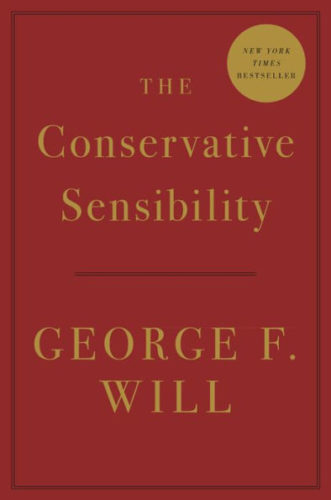Book Review: “The Conservative Sensibility” — A Plea for a Return to Normalcy
By Matt Hanson
The very people that George Will is trying to appeal to are evidently quite happy to be drunk on the power that their brutishness has created.
The Conservative Sensibility by George Will. Hachette Books, 640 pages.

George Will is a one of the few left on the right who still fits the rapidly dwindling coterie of bow-tied, high-toned, Ivy League conservative thinky types. Winner of a Pulitzer Prize, widely published, he’s been sought out as a commentator on topics like the Presidency and baseball. Will tends to be pretty even-tempered in person and on the page, which is a relief, given the constant ire from most Fox News types and the nonstop ressentiment of talk radio. Lately Will’s done some encouraging things like withdrawing his formal registration as a Republican and publicly calling out the GOP as a “cult of personality.” Unlike most of those who have been getting traction on the right since at least the nineties, Will’s got a droll sense of humor, impressive erudition, and is an atheist. But the jury is out on whether or not it will be enough to make a dent in those he clearly wants to persuade.
Will’s new 500-plus page doorstopper seems like an attempt at a magnum opus and is grandly titled The Conservative Sensibility. Note the slightly overambitious tone — Will’s clear goal here is to offer a definitive statement about what conservatism really means. It’s THE conservative sensibility, not A conservative sensibility. Will has stated that he intends for this book to be used as a guideline for what future conservatism will look like. But when you push aside the frilly lace curtains of Will’s scholarliness and calls for prudence, it becomes clear that his ideas about what true conservatism really means are actually both more predictable and more irrelevant than he assumes. Will’s plea for a more measured sensibility from the right has been consistently trampled over by those leading the rightward charge, who clearly don’t feel the need to slow down and take moral inventory anytime soon. Moderation and governmental restraint are for losers and wimps.
Will bases some of his arguments for a return to a more cautious style of governance on the Constitutional example set by the founders, which is reasonable enough. It’s quite true that Madison, for one, worried deeply about the tendency for democracies to surrender to charismatic demagogues and that We The People just can’t always be relied on to do what is in their best interests. The government was designed to be a system of checks and balances for a reason, and a very good one, even if it can be extremely frustrating to watch in real time. The problem is that in many cases, especially these days, the arguments over getting various legislation initiatives passed aren’t being conducted in good faith, if they ever were. As a longtime admirer of Barry Goldwater, who opposed desegregation because it made the Constitution cry, Will should recognize how morally and politically limited strictly literal interpretations of the constitution really are.
Will rightfully points out that the founders hoped that competing partisan interests would be made to check each other’s ambitions, but instead we’ve seen how one party has gamed the system and effectively denied the existence of the reality that can be mutually discussed. It’s good to be reminded that the founders were at loggerheads half the time, as Will only passively notes, with Hamilton the hustler lobbying for city-slicker stuff such as establishing a national bank and Jefferson pushing for an agrarian economy that would leave you-know-who to toil away in those verdant fields. For all their genius, sentimentalizing the philosophical disinterestedness of the founding fathers is a mug’s game.
It shouldn’t be forgotten that the Constitution was (and is) a revolutionary document born from a literally revolutionary act, and those wigged property-holding old white men had openly demanded, and in many cases literally shed blood for, a radical overthrowing of the established order of kings and colonies, which ought to be a useful reminder that America’s founding principles have always had a deeply revolutionary potential. We’re more critical of the blind spots and hypocrisies of the founders now, as we should be, since they were all-too-human in their hypocrisy about slavery and sexism, etc., which Will only gingerly touches on. But America’s grand philosophical reach — “all men are created equal,” the Bill of Rights, and all the rest of it — has always in reality eluded its grasp. We are now, and have been, perpetually failing to live up to an almost impossible vision for the country. Pursuing more moderation in government isn’t going to get us closer to it anytime soon.
When it comes to economics, Will offers the typical conservative bugaboos about government interference in the free market. There are endless reasons why free market economics is bunk, but Will seems almost shockingly naïve when he says that “capitalism requires, and therefore develops, a society in which economic dealings are lubricated by the disposition and ability to trust strangers.” For example, says Will, when you walk into a store, the first question you’re asked is how can I help you? A commercial society will naturally be more sociable, he suggests, because it will instill industrious virtues into the populace. He scoffs at FDR’s New Deal call for a second bill of economic rights and makes fun of his perfectly reasonable statement that “necessitous men are not free men.” Will not only takes this way out of context — this was a jittery, starving, post-Depression America Roosevelt was addressing — but he grumbles obtusely about the absurdity of government addressing “necessity” and “meaning.”

George Will signing his attempted magnum opus. Photo: Twitter.
Well, this will be news to any of the millions of people who has to fight with their private insurer to cover some life-saving but expensive medicine or surgery, or who got laid off from the plant after 30 years because it was more profitable for their company to move overseas, or who lost their credit rating to predatory lending practices, and those are just examples taken from people I know personally. Will’s using a figure of speech, but he has an elitist naivete about the true nature of customer service — store employees don’t ask if they can help you because they care about serving you. It’s because they are at the mercy of the customer’s whims in order to survive. Which, as anyone who has worked in retail or for tips knows, when these service-based jobs aren’t enough to pay the bills, that obsequiousness turns into rage down the line.
There are positive aspects of a commercial society, certainly, but it also instills a Darwinistically nihilist mentality that will gradually transform all human interactions into transactions, which ultimately turns communities into hordes of amateur salesmen always hustling to find the next sucker to rip off or to find someone who will buy whatever they can sell. Will devotes a slightly reserved chapter to the idea that we really shouldn’t be mad or envious at the 1% having mind-boggling amounts of wealth, since that’s just the breaks. That may be true in a certain way, but it is a very hard sell for pretty much anybody who understands the elemental point that many other people’s sweat went into those fortunes.
Recently, when Will has been asked why there’s no mention of Trump in the book, he scoffed and said with a slightly performative gruffness, “for the same reason that I don’t mention Doris Day!” Well, the quip is amusing in a way, but at the same time he’s missing something extremely important and problematic. There’s a hulking orange shadow cast over all these thoroughly footnoted, thoughtfully argued pages. Conservative voters have had plenty of chances to vote for moderation and they decided they’d rather scapegoat, talk trash, and whine about losing their cultural and ethnic supremacy.
While our semi-elected President continually hacks away at our institutions, it’s ironic to notice how things have swung in the opposite direction. In the ’60’s and ’70’s it was the uptight conservative types who shuddered at the left’s vulgarity, trash-talking, and throwing over social norms. Now history’s wrecking ball is swinging on the opposite side; it’s the left who are sticking up for the validity of our institutions and trying to establish new social mores while the hoodlum right sneers with glee over the damage done to “the system” by the “elites.” Despite what Will wants to believe, it’s not at all hard to see these days that there isn’t really much that carefully articulated arguments can do when they’re not just ignored but crumpled up and ripped into confetti by a crude, paranoid, autocratic demagogue and his minions.
Almost adorably, Will wants to make a plea for a return to normalcy, modesty, and a return to first principles. Would that it could be so. But after observing a single session in Congress, filling a Supreme Court seat, or checking the latest poll numbers in red states, it’s easy to see that the very people Will is trying to appeal to are evidently quite happy to be drunk on the power that their brutishness has created. Whether Trump is President or not, the rage and spite that elected him in the first place still wants to be fed and isn’t shy about doing whatever it takes to get what it wants. Instead of refined debates over the proper proportions of sense and sensibility, they’ve chosen the bread and circuses.
Matt Hanson is a critic for The Arts Fuse living outside Boston. His writing has appeared in The Millions, 3QuarksDaily, and Flak Magazine (RIP), where he was a staff writer. He blogs about movies and culture for LoveMoneyClothes. His poetry chapbook was published by Rhinologic Press.

A typically fine piece from Matt, but he seems to have caught some of Will’s soggy gentility. The brutishness and ignorance of Trump and his followers make them the sons and daughters of Will, whether he will accept them or not. For example, on the seminal issue of our time (and times to come) Will has been on the same page as Trump for decades — a denier who in his case uses his syndicated columns to spread misinformation and obfuscation. See this piece in Think Progress. If ‘the conservative sensibility’ will not accept scientifically-verified reality there will be no return to normality — it will more likely mean the intensification of our current abnormality.
No doubt that climate change denial is a serious issue, and one that conservatives either laugh off, deny, or obfuscate about. Will’s very invested in portraying himself as a Serious Person and that’s to some degree better than the alternative, because at least he’s trying, but it is striking to see (in more places than I could fit in a normal-sized piece) how blithely his views overlap the with the mouth-breathing sort on the right. Same soup, just a fancier can.
I agree — though I would add that the date on the can has expired.